127 start with C start with C
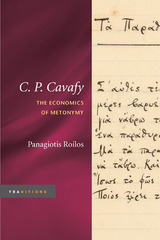
Konstantinos P. Kavafis--known to the English-reading world as C. P. Cavafy--has been internationally recognized as an important poet and attracted the admiration of eminent literary figures such as E. M. Forster, F. T. Marinetti, W. H. Auden, George Seferis, and James Merrill. Cavafy's idiosyncratic poetry remains one of the most influential and perplexing voices of European modernism.
Focusing on Cavafy's intriguing work, this book navigates new territories in critical theory and offers an interdisciplinary study of the construction of (homo)erotic desire in poetry in terms of metonymic discourse and anti-economic libidinal modalities. Panagiotis Roilos shows that problematizations of art production, market economy, and trafficability of erôs in diverse late-nineteenth and early twentieth-century European sociocultural and political contexts were re-articulated in Cavafy's poetry in new subversive ways that promoted an "unorthodox" discursive and libidinal anti-economy of jouissance.

In his study of Canada, John A. Stovel examines the changes in that country’s balance of payments and balance of trade from confederation to the present day, including as part of his examination historical, statistical, and theoretical points of view. The author also reexamines critically—and finds himself in sharp disagreement with—Jacob Viner’s classic in the field, Canada’s Balance of International Indebtedness, 1900-1913, which has long been considered the definitive analysis of the subject.
Developing in Part I an eclectic theory of international balance of payments, and in Part II concentrating on the Canadian balance of trade and balance of payments in relation to economic developments preceding World War I, Stovel carefully prepares the foundation for a critique of Viner’s analysis of the period 1900-1913. Discussing the inadequacy of the Mill-Taussig theory and its empirical verification, and observing the extent to which the newer theoretical developments have afforded increased understanding, Stovel criticizes Viner’s statistics and the use to which they were put. He delineates with telling clarity the mutual interaction of many elements in cyclical growth development, as opposed to the oversimplified and inadequate causal links of the earlier theory.
In addition to the wealth of analysis of the earlier period, the author investigates the interwar period, with the postwar boom and the depression of the thirties, presenting a careful analysis of the structural changes in the balance of payments during this period as well as indicating the change in Canada’s relation to the United States and Great Britain. The concluding section of the book deals with the period following World War II, and the author indicates the possible lessons to be learned from Canada’s experiences and the improvements in government policy that have taken place, especially with respect to exchange rates.

The Cancer Stage of Capitalism is a modern classic of critical philosophy and political economy, renowned for its depth and comprehensive research. It provides a step by step diagnosis of the continuing economic collapse in the US and Europe and has had an enormous influence on new visions of economic alternatives.
John McMurtry argues that our world disorder of unending crises is the predictable result of a cancerous economic system multiplying out of all control and destroying ecological, social and organic life - a process he describes as 'global ecogenocide'. In this updated edition he explains the ‘social immune response’ required to fight the ‘macro cancer’, something which has already been shown in developments such as the Occupy movement and the democratic social transformation of Latin America.
In an official global culture increasingly destructive of life, this book shows the necessity and possibility of building a sustainable society based on a universal commitment to life and nature.
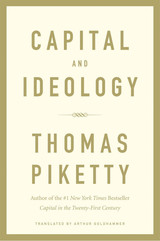
A New York Times Bestseller
An NPR Best Book of the Year
The epic successor to one of the most important books of the century: at once a retelling of global history, a scathing critique of contemporary politics, and a bold proposal for a new and fairer economic system.
Thomas Piketty’s bestselling Capital in the Twenty-First Century galvanized global debate about inequality. In this audacious follow-up, Piketty challenges us to revolutionize how we think about politics, ideology, and history. He exposes the ideas that have sustained inequality for the past millennium, reveals why the shallow politics of right and left are failing us today, and outlines the structure of a fairer economic system.
Our economy, Piketty observes, is not a natural fact. Markets, profits, and capital are all historical constructs that depend on choices. Piketty explores the material and ideological interactions of conflicting social groups that have given us slavery, serfdom, colonialism, communism, and hypercapitalism, shaping the lives of billions. He concludes that the great driver of human progress over the centuries has been the struggle for equality and education and not, as often argued, the assertion of property rights or the pursuit of stability. The new era of extreme inequality that has derailed that progress since the 1980s, he shows, is partly a reaction against communism, but it is also the fruit of ignorance, intellectual specialization, and our drift toward the dead-end politics of identity.
Once we understand this, we can begin to envision a more balanced approach to economics and politics. Piketty argues for a new “participatory” socialism, a system founded on an ideology of equality, social property, education, and the sharing of knowledge and power. Capital and Ideology is destined to be one of the indispensable books of our time, a work that will not only help us understand the world, but that will change it.
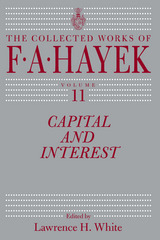

The book is the first comprehensive study of the American copper industry to include labor markets, unionism, and labor relations as an integral part of its focus. It also undertakes a careful examination of the influences exerted by geography and geology in the shaping of the industry.
The study begins with the formation, development, and later histories of all the principal copper producers, their major business and labor policies, technical innovations, attempts at diversification, and foreign ventures. On the labor side, the book examines the beginnings of unionism in the 1880s; the emergence of the Western Federation of Miners in 1893; the later appearance of the International Union of Mine, Mill and Smelter Workers in 1916. The eventual takeover of the Mine Mill by the Steel workers in 1967 and the reasons for the eventual collapse of the pattern system in 1983 are also carefully considered.
The study emphasizes the role of strategic innovations in shaping American copper history, most prominently in the successive development of underground block-caving and open-pit mining; concentration and flotation; and solvent extraction and electrowinning. The study concludes with an evaluation of the lessons supplied by the past and the prospects for the future of the industry.
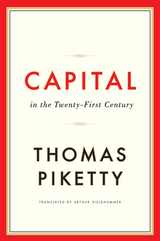
A New York Times #1 Bestseller
An Amazon #1 Bestseller
A Wall Street Journal #1 Bestseller
A USA Today Bestseller
A Sunday Times Bestseller
A Guardian Best Book of the 21st Century
Winner of the Financial Times and McKinsey Business Book of the Year Award
Winner of the British Academy Medal
Finalist, National Book Critics Circle Award
What are the grand dynamics that drive the accumulation and distribution of capital? Questions about the long-term evolution of inequality, the concentration of wealth, and the prospects for economic growth lie at the heart of political economy. But satisfactory answers have been hard to find for lack of adequate data and clear guiding theories. In Capital in the Twenty-First Century, Thomas Piketty analyzes a unique collection of data from twenty countries, ranging as far back as the eighteenth century, to uncover key economic and social patterns. His findings will transform debate and set the agenda for the next generation of thought about wealth and inequality.
Piketty shows that modern economic growth and the diffusion of knowledge have allowed us to avoid inequalities on the apocalyptic scale predicted by Karl Marx. But we have not modified the deep structures of capital and inequality as much as we thought in the optimistic decades following World War II. The main driver of inequality—the tendency of returns on capital to exceed the rate of economic growth—today threatens to generate extreme inequalities that stir discontent and undermine democratic values. But economic trends are not acts of God. Political action has curbed dangerous inequalities in the past, Piketty says, and may do so again.
A work of extraordinary ambition, originality, and rigor, Capital in the Twenty-First Century reorients our understanding of economic history and confronts us with sobering lessons for today.
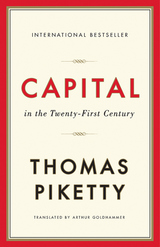
A New York Times #1 Bestseller
An Amazon #1 Bestseller
A Wall Street Journal #1 Bestseller
A USA Today Bestseller
A Sunday Times Bestseller
A Guardian Best Book of the 21st Century
Winner of the Financial Times and McKinsey Business Book of the Year Award
Winner of the British Academy Medal
Finalist, National Book Critics Circle Award
“It seems safe to say that Capital in the Twenty-First Century, the magnum opus of the French economist Thomas Piketty, will be the most important economics book of the year—and maybe of the decade.”
—Paul Krugman, New York Times
“The book aims to revolutionize the way people think about the economic history of the past two centuries. It may well manage the feat.”
—The Economist
“Piketty’s Capital in the Twenty-First Century is an intellectual tour de force, a triumph of economic history over the theoretical, mathematical modeling that has come to dominate the economics profession in recent years.”
—Steven Pearlstein, Washington Post
“Piketty has written an extraordinarily important book…In its scale and sweep it brings us back to the founders of political economy.”
—Martin Wolf, Financial Times
“A sweeping account of rising inequality…Piketty has written a book that nobody interested in a defining issue of our era can afford to ignore.”
—John Cassidy, New Yorker
“Stands a fair chance of becoming the most influential work of economics yet published in our young century. It is the most important study of inequality in over fifty years.”
—Timothy Shenk, The Nation
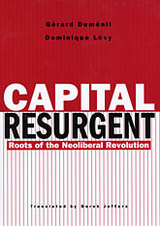
The advent of economic neoliberalism in the 1980s triggered a shift in the world economy. In the three decades following World War II, now considered a golden age of capitalism, economic growth was high and income inequality decreasing. But in the mid-1970s this social compact was broken as the world economy entered the stagflation crisis, following a decline in the profitability of capital. This crisis opened a new phase of stagnating growth and wages, and unemployment. Interest rates as well as dividend flows rose, and income inequality widened.
Economists Gérard Duménil and Dominique Lévy show that, despite free market platitudes, neoliberalism was a planned effort by financial interests against the postwar Keynesian compromise. The cluster of neoliberal policies--including privatization, liberalization of world trade, and reduction in state welfare benefits--is an expression of the power of finance in the world economy.
The sequence of events initiated by neoliberalism was not unprecedented. In the late nineteenth century, when economic conditions were similar to those of the 1970s, a structural crisis led to the first financial hegemony culminating in the speculative boom of the late 1920s. The authors argue persuasively for stabilizing the world economy before we run headlong into another economic disaster.

The new chairman of President Reagan's Council of Economic Advisers, Martin Feldstein is also the leading economist in the field of tax analysis. In this important volume he shows how systems of taxation influence the rate and nature of capital formation—a key policy issue in the development of any economy.
The first part of Capital Taxation deals with the overall rate of saving and examines the effects of taxes on both personal and corporate saving as well as on the interaction between the two. The second section describes the effects of tax rules on household portfolios: selection and size of investment and the process of portfolio adjustment. In Part 3, Feldstein turns to corporate investment in plant and equipment and in inventories. Part 4 analyzes the impact of capital taxation in a growing economy. Feldstein's perceptive identification of important economic and policy questions, adroit use of modeling and new data sources, and careful attention to dynamics make this book a powerful addition to the economic literature.

Between 1951 and 1962 nearly ten billion dollars in long-term capital (both direct investment and purchase of securities) flowed into Canada. This massive amount represented one third of all long-term capital moving among industrial nations. Its transfer marked the first time since before World War I that the world witnessed such a large-scale international movement of capital motivated primarily by a prospect of higher rates of return.
In Capital Transfers and Economic Policy the authors test the theory of the causes and effects of international capital movements against the evidence drawn from Canada's experience. They explore Canada's adjustment to capital flows and show how the operation of her economic policy is affected by the sensitivity of capital flows to the country's interest rates and foreign-exchange rate.
Their brilliant analysis is particularly valuable in light of current trends in capital flows among industrial nations and the June 1970 return of the Canadian dollar to a flexible exchange rate, which put the economy in a working situation similar to that of the fifties.
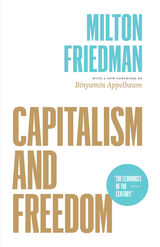
One of Times Literary Supplement’s 100 Most Influential Books Since the War
One of National Review’s 100 Best Nonfiction Books of the Century
One of Intercollegiate Studies Institute’s 50 Best Books of the 20th Century
How can we benefit from the promise of government while avoiding the threat it poses to individual freedom? In this classic book, Milton Friedman provides the definitive statement of an immensely influential economic philosophy—one in which competitive capitalism serves as both a device for achieving economic freedom and a necessary condition for political freedom.
First published in 1962, Friedman’s Capitalism and Freedom is one of the most significant works of economic theory ever written. Enduring in its eminence and esteem, it has sold nearly a million copies in English, has been translated into eighteen languages, and continues to inform economic thinking and policymaking around the world. This new edition includes prefaces written by Friedman for both the 1982 and 2002 reissues of the book, as well as a new foreword by Binyamin Appelbaum, lead economics writer for the New York Times editorial board.
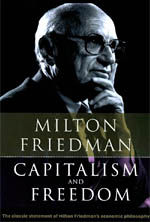
"Milton Friedman is one of the nation's outstanding economists, distinguished for remarkable analytical powers and technical virtuosity. He is unfailingly enlightening, independent, courageous, penetrating, and above all, stimulating."-Henry Hazlitt, Newsweek
"It is a rare professor who greatly alters the thinking of his professional colleagues. It's an even rarer one who helps transform the world. Friedman has done both."-Stephen Chapman, Chicago Tribune
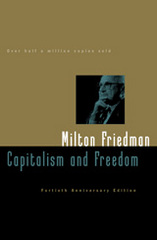
How can we benefit from the promise of government while avoiding the threat it poses to individual freedom? In this classic book, Milton Friedman provides the definitive statement of his immensely influential economic philosophy—one in which competitive capitalism serves as both a device for achieving economic freedom and a necessary condition for political freedom. The result is an accessible text that has sold well over half a million copies in English, has been translated into eighteen languages, and shows every sign of becoming more and more influential as time goes on.
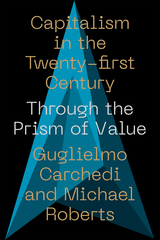
Contemporary capitalism is always evolving. From digital technologies to cryptocurrencies, current trends in political economy are much discussed, but often little understood. So where can we turn for clarity? As Michael Roberts and Guglielmo Carchedi argue, new trends don't necessarily call for a new theory.
In Capitalism in the 21st Century, the authors show how Marx's law of value explains numerous issues in our modern world. In both advanced economies and the periphery, value theory provides a piercing analytical framework through which we can approach topics as varied as labor, profitability, technology, the environment, the role of China, imperialism, and the state.
An ambitious work that will appeal to both heterodox economists and labor movement activists alike, as it demonstrates the ongoing contemporary relevance of Marxist theory to current trends in political economy.
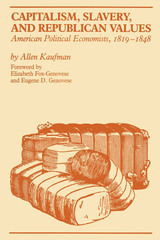
In the troubled days before the American Civil War, both Northern protectionists and Southern free trade economists saw political economy as the key to understanding the natural laws on which every republican political order should be based. They believed that individual freedom was one such law of nature and that this freedom required a market economy in which citizens could freely pursue their particular economic interests and goals.
But Northern and Southern thinkers alike feared that the pursuit of wealth in a market economy might lead to the replacement of the independent producer by the wage laborer. A worker without property is a potential rebel, and so the freedom and commerce that give birth to such a worker would seem to be incompatible with preserving the content citizenry necessary for a stable, republican political order.
Around the resolution of this dilemma revolved the great debate on the desirability of slavery in this country. Northern protectionists argued that independent labor must be protected at the same time that capitalist development is encouraged. Southern free trade economists answered that the formation of a propertyless class is inevitable; to keep the nation from anarchy and rebellion, slavery—justified by racism—must be preserved at any cost.
Battles of the economists such as these left little room for political compromise between North and South as the antebellum United States confronted the corrosive effects of capitalist development. And slavery's retardant effect on the Southern economy ultimately created a rift within the South between those who sought to make slavery more like capitalism and those who sought to make capitalism more like slavery.

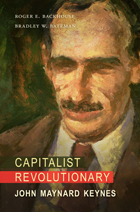
The Great Recession of 2008 restored John Maynard Keynes to prominence. After decades when the Keynesian revolution seemed to have been forgotten, the great British theorist was suddenly everywhere. The New York Times asked, “What would Keynes have done?” The Financial Times wrote of “the undeniable shift to Keynes.” Le Monde pronounced the economic collapse Keynes’s “revenge.” Two years later, following bank bailouts and Tea Party fundamentalism, Keynesian principles once again seemed misguided or irrelevant to a public focused on ballooning budget deficits. In this readable account, Backhouse and Bateman elaborate the misinformation and caricature that have led to Keynes’s repeated resurrection and interment since his death in 1946.
Keynes’s engagement with social and moral philosophy and his membership in the Bloomsbury Group of artists and writers helped to shape his manner of theorizing. Though trained as a mathematician, he designed models based on how specific kinds of people (such as investors and consumers) actually behave—an approach that runs counter to the idealized agents favored by economists at the end of the century.
Keynes wanted to create a revolution in the way the world thought about economic problems, but he was more open-minded about capitalism than is commonly believed. He saw capitalism as essential to a society’s well-being but also morally flawed, and he sought a corrective for its main defect: the failure to stabilize investment. Keynes’s nuanced views, the authors suggest, offer an alternative to the polarized rhetoric often evoked by the word “capitalism” in today’s political debates.

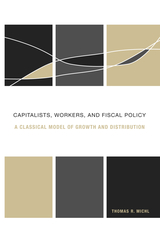
Drawing on the work of the classical-Marxian economists and their modern successors, Capitalists, Workers, and Fiscal Policy sets forth a new model of economic growth and distribution, and applies it to two major policy issues: public debt and social security.
The book homes in specifically on the problem of fiscal policy, examining the ways that taxation and government spending affect the distribution of wealth and income as well as the rate of economic growth. Thomas Michl’s model shows that public debt has a regressive effect on wealth distribution. It also demonstrates that the accumulation of wealth by public authorities, for example, in the form of a pension reserve such as the U.S. social security trust fund, can have a progressive effect on wealth distribution, both directly (since it represents ownership by the citizenry) and indirectly through its general equilibrium effects on the structure of accumulation. The book’s findings provide an analytical foundation for a macroeconomic policy of using fiscal surpluses to accumulate a public pension reserve fund that serves to effect a progressive redistribution of wealth.
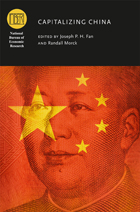
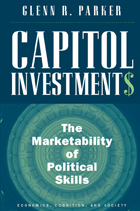
“Who would spend millions for a job that pays $250k? Parker’s answer will surprise you. Required reading for Congress jocks.”
—Michael C. Munger, Duke University
“A unique and interesting approach to the study of legislators and legislative institutions.”
—David Brady, Stanford University
What would you do if, the very day you were hired, you knew you could be unemployed in as little as two years? You’d seek opportunities in your current job to develop a portfolio of skills and contacts in order to make yourself more attractive to future employers. Representatives and senators think about their jobs in Congress in precisely this way, according to Glenn R. Parker.
While in office, members of Congress plan not merely for the next election but for the next stage of their careers. By networking, serving on committees, and championing particular legislation, they deliberately accumulate human capital—expertise, networks, and reputation—which later gives them advantages on the job market. Parker’s study of the postelective careers of more than 200 former members of Congress who left office during the last half century shows that, in most cases, the human capital these politicians amassed while in office increased their occupational mobility and earning power.
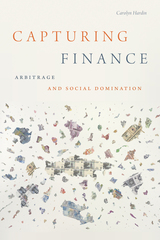


Contemporaries of Carroll D. Wright (1840-1909) lived through the transformation of American society by the industrial revolution. For the most part they thought the transformation represented growth and progress, but many also found occasion for doubt and fear in its consequences. Their anxieties collected around the notions of a "labor problem" and "labor reform." Whether from hope or fear, people felt a need for statistical information. On this popular demand Wright built his career as statistical expert and renowned master of "labor statistics." His investigations during thirty-two years of government service (1873-1905) gave form to contemporary ideas and set precedents for modern procedures, as in his seminal studies of wages, prices, and strikes.
In telling how Wright took up this unprecedented career, Mr. Leiby shows the importance of Wright's early years and relates his work to the politics and religion of his time as well as to its social science. In this perspective, the history of the labor bureaus and their voluminous reports take on their original human purposes and meaning.
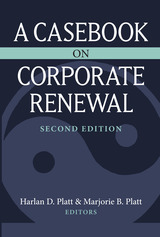
The cases challenge students to actively engage in the decision-making process in order to learn how corporate renewal is practiced in real business settings. The Casebook is meant to accompany the third edition of Principles of Corporate Renewal by Harlan D. Platt, but it can be adopted separately or used with other management textbooks.
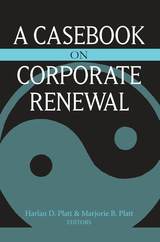
The cases challenge students to actively engage in the decision-making process in order to learn how corporate renewal is practiced in real business settings. The Casebook is meant to accompany the second edition of Principles of Corporate Renewal by Harlan D. Platt, but it can be adopted separately or used with other management textbooks.

Modern credit, developed during the financial revolution of 1620–1720, laid the foundation for England’s political, military, and economic dominance in the eighteenth century. Possessed of a generally circulating credit currency, a modern national debt, and sophisticated financial markets, England developed a fiscal–military state that instilled fear in its foes and facilitated the first industrial revolution. Yet a number of casualties followed in the wake of this new system of credit. Not only was it precarious and prone to accidents, but it depended on trust, public opinion, and ultimately violence.
Carl Wennerlind reconstructs the intellectual context within which the financial revolution was conceived. He traces how the discourse on credit evolved and responded to the Glorious Revolution, the Scientific Revolution, the founding of the Bank of England, the Great Recoinage, armed conflicts with Louis XIV, the Whig–Tory party wars, the formation of the public sphere, and England’s expanded role in the slave trade. Debates about credit engaged some of London’s most prominent turn-of-the-century intellectuals, including Daniel Defoe, John Locke, Isaac Newton, Jonathan Swift and Christopher Wren. Wennerlind guides us through these conversations, toward an understanding of how contemporaries viewed the precariousness of credit and the role of violence—war, enslavement, and executions—in the safeguarding of trust.
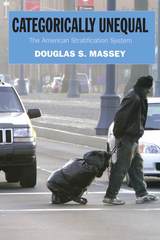
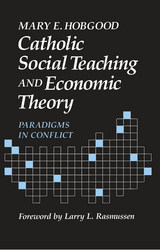

Inequality is skyrocketing. In this world of vast riches, millions of people live in extreme poverty, barely surviving from day to day. All over the world, the wealthy's increasing political power is biasing policy away from the public interest and toward the financial interests of the rich. At the same time, many countries are facing financial fragility and diminished well-being. On top of it all, the global economy, driven by fossil fuels, has proven to be a collective act of self-sabotage with the poor on the front lines. In a new foreword to his book, Anthony M. Annett examines the Biden administration's economic policies and discusses reactions to Cathonomics.
A growing chorus of economists and politicians is demanding a new paradigm to create a global economy that seeks the common good. In Cathonomics, Annett unites insights in economics with those from theology, philosophy, climate science, and psychology, exposing the failures of neoliberalism while offering us a new model rooted in the wisdom of Catholic social teaching and classical ethical traditions. Drawing from the work of Pope Leo XIII, Pope Francis, Thomas Aquinas, and Aristotle, Annett applies these teachings to discuss current economic challenges, such as inequality, unemployment and underemployment, climate change, and the roles of business and finance.
Cathonomics is an ethical and practical guide for readers of all faiths and backgrounds seeking to create a world economy that is more prosperous, inclusive, and sustainable for all.
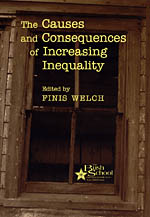
This volume draws together a panel of distinguished scholars who address these issues in terms comprehensible to noneconomists. Their findings are surprising, suggesting that factors such as trade imbalances, immigration rates, and differences in educational resources do not account for recent increases in the inequality of wealth and earnings. Rather, the contributors maintain that these discrepancies can be attributed to workplace demand for high-skilled labor. They also insist that further research must examine the organization of industry in order to better understand the concurrent devaluation of manual labor.
Addressing a topic that is of considerable public interest, this collection helps move the issue of increasing economic inequality in America to the center of the public policy arena.
Contributors: Donald R. Deere, Claudia Goldin, Lawrence F. Katz, James P. Smith, Franco Peracchi, Gary Solon, Eric A. Hanushek, Julie A. Somers, Marvin H. Kosters, William Cline, Finis Welch, Angus Deaton, Charles Murray, Kevin Murphy

In 1950, when he was 22 years old, Nash presented his key idea—the Nash equilibrium—in the Ph.D. thesis he submitted to the Mathematics Department at Princeton University. In that paper, he defined a new concept of equilibrium and used methods from topology to prove the existence of an equilibrium point for n-person, finite, non-cooperative games, that is, for games in which the number of possible strategies are limited, no communication is allowed between the players, and n represents the number of players. The Nash equilibrium point is reached when none of the players can improve their position by changing strategies. By taking into account situations involving more than two players, specifically the general n-player game, Nash built significantly on the previous work of John Von Neumann and Oskar Morgenstern.
Contributors. Abbas Bahri, Eric A. Carlen, Ennio De Giorgi, Charles Fefferman, Srihari Govidan, John C. Harsanyi, H. Hoffer, Carlos E. Kenig, S. Klainerman, Harold F. Kuhn, Michael Loss, William F. Lucas, M. Machedon, Roger B. Myerson, Raghavan Narasimhan, John F. Nash Jr., Louis Nirenberg, Jill Pipher, Zeév Rudnick, Peter Sarnak, Michael Shub, Steve Smale, Robert Wilson, K. Wysocki, E. Zehnder

"The failure of the annual harvest is still an event of greater importance in the lives of the Russian people than...what happens to steel production."--from the Introduction
With over 540 million acres sown to crops the Soviet Union was one of the world's agricultural giants. Yet agriculture was the Achilles heel of the Soviet economy. Public pronouncements of Russian leaders--prerevolutionary and postrevolutionary alike--attested the crucial role of the agricultural problem, its economically and politically explosive nature, and its persistence over the years.
This is one of the most thorough studies ever made of Russian agriculture. Emphasizing the continuity of problems and policies too often dichotomized into tsarist and Soviet eras, Volin has created a monumental work--a sweeping panorama of the century between the emancipation of the serfs and the 1960s.
The author begins by recounting the development of serfdom and describing the emancipation and subsequent problem of land distribution. In the first part ofthe book he also explores the first agrarian revolution (1905) and the reforms that followed it, as well as the conditions during World War I that led to the Revolution of 1917.
In Part II he treats agricultural conditions during the Civil War, attempts made to restore the economy by means of the New Economic Policy, Stalin's programof forced collectivization and liquidation of the kulaks, agricultural conditions during World War II--including Nazi policies in occupied territory--and the policies of Stalin in the postwar recovery.
The longest section of the book is devoted to the Khrushchev era. It covers capital investment and expansion of sown acreage, incentives for the kolkhozniks, their income, and the supply of consumer goods, as well as mechanization and electrification programs, the state farms, rates of production, and administrative control and planning.
The final chapter summarizes the past century and comments on the outlook for the future.
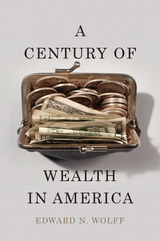
Understanding wealth in the United States—who has it, how they acquired it, and how they preserve it—is crucial to addressing the economic and political challenges facing the nation. But until now we have had little reliable information. Edward Wolff, one of the world’s great experts on the economics of wealth, offers an authoritative account of patterns in the accumulation and distribution of wealth since 1900.
A Century of Wealth in America demonstrates that the most remarkable change has been the growth of per capita household wealth, which climbed almost eightfold prior to the 2007 recession. But overlaid on this base rate are worrying trends. The share of personal wealth claimed by the richest one percent almost doubled between the mid-1970s and 2013, concurrent with a steep run-up of debt in the middle class. As the wealth of the average family dropped precipitously—by 44 percent—between 2007 and 2013, with black families hit hardest, the debt-income ratio more than doubled. The Great Recession also caused a sharp spike in asset poverty, as more and more families barely survived from one paycheck to the next. In short, the United States has changed from being one of the most economically equal of the advanced industrialized countries to being one of the most unequal.
At a time of deep uncertainty about the future, A Century of Wealth in America provides a sober bedrock of facts and astute analysis. It will become one of the few indispensable resources for contemporary public debate.

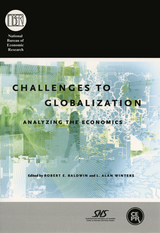
Challenges to Globalization evaluates the arguments of pro-globalists and anti-globalists regarding issues such as globalization's relationship to democracy, its impact on the environment and on labor markets including the brain drain, sweat shop labor, wage levels, and changes in production processes, and the associated expansion of trade and its effects on prices. Baldwin, Winters, and the contributors to this volume look at multinational firms, foreign investment, and mergers and acquisitions and present surprising findings that often run counter to the claim that multinational firms primarily seek countries with low wage labor. The book closes with papers on financial opening and on the relationship between international economic policies and national economic growth rates.

Barend A. de Vries, a distinguished international economist, examines the economic roots of poverty, the actions that can be taken to eradicate it, and the ethical case for integrating the poor into the mainstream of society.
De Vries applies Judeo-Christian ethics—in particular, the values of social justice and compassion for the poor—to the problem of poverty in both the United States and in developing countries. Bringing together the insights of economics and ethicists, he considers both the economic feasibility of religious views regarding the eradication of poverty and the ethical aspects of economic programs. He analyzes the poverty of women resulting from discrimination, the impact of environmental degradation on the poor, the allocation of funding to military rather than social programs, and the implications of the enormous debts incurred by poor countries. In addressing these conditions, he demonstrates the pressing need for action on both economic and ethical grounds.
Champions of the Poor offers an unbiased presentation of the ethical positions taken by Jews, Catholics, mainline Protestants, and Evangelicals and stresses the need for all social sectors—religious and secular, business, labor and government—to work together to eradicate poverty. By reassessing poverty from these seemingly disparate approaches, it seeks to bring us closer to solving this age-old problem.

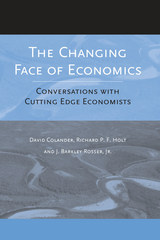
The interviews and commentary together demonstrate that economics is currently undergoing a fundamental shift in method and is moving away from traditional neoclassical economics into a dynamic set of new methods and approaches. These new approaches include work in behavioral economics, experimental economics, evolutionary game theory and ecological approaches, complexity and nonlinear dynamics, methodological analysis, and agent-based modeling.
David E. Colander is Professor of Economics, Middlebury College.
J. Barkley Rosser, Jr., is Professor of Economics and Kirby L. Kramer Jr. Professor of Business Administration, James Madison University.
Richard P. F. Holt is Professor of Churchill Honors and Economics, Southern Oregon University.
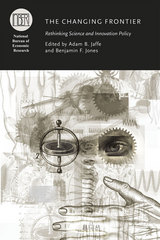
In The Changing Frontier, Adam B. Jaffe and Benjamin Jones bring together a group of prominent scholars to consider the changes in science and innovation in the ensuing decades. The contributors take on such topics as changes in the organization of scientific research, the geography of innovation, modes of entrepreneurship, and the structure of research institutions and linkages between science and innovation. An important analysis of where science stands today, The Changing Frontier will be invaluable to practitioners and policy makers alike.
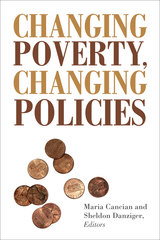

The essays in this volume consider the application of chaos theory to such diverse phenomena as public opinion, the behavior of states in the international arena, the development of rational economic expectations, and long waves.
Contributors include Brian J. L. Berry, Thad Brown, Kenyon B. DeGreene, Dimitrios Dendrinos, Euel Elliott, David Harvey, L. Ted Jaditz, Douglas Kiel, Heja Kim, Michael McBurnett, Michael Reed, Diana Richards, J. Barkley Rosser, Jr., and Alvin M. Saperstein.
L. Douglas Kiel and Euel W. Elliott are both Associate Professors of Government, Politics, and Political Economy, University of Texas at Dallas.

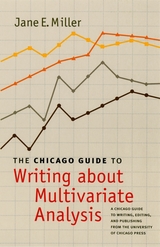
Here, Jane Miller offers much-needed help to academic researchers as well as to analysts who write for general audiences. The Chicago Guide to Writing about Multivariate Analysis brings together advanced statistical methods with good expository writing. Starting with twelve core principles for writing about numbers, Miller goes on to discuss how to use tables, charts, examples, and analogies to write a clear, compelling argument using multivariate results as evidence.
Writers will repeatedly look to this book for guidance on how to express their ideas in scientific papers, grant proposals, speeches, issue briefs, chartbooks, posters, and other documents. Communicating with multivariate models need never appear so complicated again.
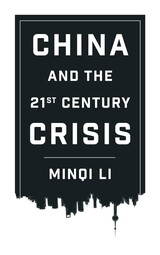
Li roots his argument in an analysis of the political and economic imbalances in China that would exacerbate a crisis, and possibly even precipitate a full collapse—and he shows in detail the reasons why that collapse could happen much more quickly than anyone imagines. Writing from a Marxist and ecologically oriented perspective, Li shows unequivocally that the limits to capitalism are fast approaching, and that events in China—essentially the last great frontier for capitalist expansion—are likely to be pivotal.

This is the first book to survey China’s growing role in Southeast Asia along multiple dimensions. It looks closely and skeptically at the multitude of ways that China has built connections in the region, including through trade, foreign aid, and cultural diplomacy. It incorporates examples such as the operation of Confucius Institutes in Indonesia or the promotion of the concept of guangxi.China’s Footprints in Southeast Asia raises the question of whether the Chinese efforts are helpful or disruptive and explores who it is that really stands to benefit from these relationships. The answers differ from country to country, but, as this volume suggests, the footprint of hard and soft power always leaves a lasting mark on other countries’ institutions.
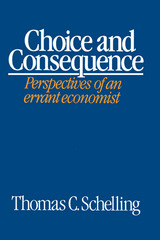
Thomas Schelling is a political economist “conspicuous for wandering”—an errant economist. In Choice and Consequence, he ventures into the area where rationality is ambiguous in order to look at the tricks people use to try to quit smoking or lose weight. He explores topics as awesome as nuclear terrorism, as sordid as blackmail, as ineffable as daydreaming, as intimidating as euthanasia. He examines ethical issues wrapped up in economics, unwrapping the economics to disclose ethical issues that are misplaced or misidentified.
With an ingenious, often startling approach, Schelling brings new perspectives to problems ranging from drug abuse, abortion, and the value people put on their lives to organized crime, airplane hijacking, and automobile safety. One chapter is a clear and elegant exposition of game theory as a framework for analyzing social problems. Another plays with the hypothesis that our minds are not only our problem-solving equipment but also the organ in which much of our consumption takes place.
What binds together the different subjects is the author’s belief in the possibility of simultaneously being humane and analytical, of dealing with both the momentous and the familiar. Choice and Consequence was written for the curious, the puzzled, the worried, and all those who appreciate intellectual adventure.
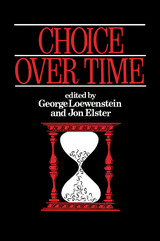
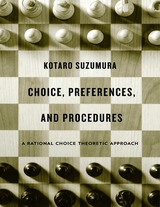
Kotaro Suzumura is one of the world’s foremost thinkers in social choice theory and welfare economics. Bringing together essays that have become classics in the field, Choice, Preferences, and Procedures examines foundational issues of normative economics and collective decision making.
Social choice theory seeks to critically assess and rationally design economic mechanisms for improving human life. An important part of Suzumura’s contribution over the past forty years has entailed fusion of abstract microeconomic ideas with an understanding of real-world economies in a coherent analysis. This volume of selected essays reveals the evolution of Suzumura’s thinking over his career. Groundbreaking papers explore the nature of individual and social choice and the idea of assigning value to freedom of choice, different forms of rationality, and concepts of individual rights, equity, and fairness.
Suzumura elucidates his innovative approach for recognizing interpersonal comparisons in the vein of Adam Smith’s notion of sympathy and expounds the effect of paying due attention to nonconsequential features, such as the opportunity to choose and the procedure for decision making, along with the standard consequential features. Analyzing the role of economic competition, Suzumura points out how restricting competition may, in some circumstances, improve social welfare. This is not to recommend government regulation rather than market competition but to emphasize the importance of procedural features in a competitive context. He concludes with illuminating essays on the history of economic thought, focusing on the ideas of Vilfredo Pareto, Arthur Pigou, John Hicks, and Paul Samuelson.

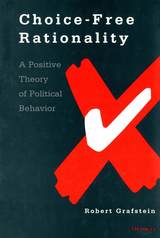
Grafstein argues that, instead of basing the analysis on the assumption that an actor will maximise her expected utility or her utility given the probability that the event will happen, we should define rationality as the maximisation of expected utility conditional on the probability that her act will bring the event about. This definition of utility, based on the work of Richard Jeffrey, restores the consequences of an individual's act to rational choice analysis. For example, in making a decision to vote, a conditional expected utility maximiser will compare the likelihood of victory for her preferred candidate given her own participation with the likelihood of a victory given her abstention.
The author shows the theoretical implications of this new definition of rationality and then uses it to explain certain aspects of ethnic identity and mobilization, ideology, and altruism and intertemporal choice. He then explores the implications of this idea for policy analysis and econometrics. This book will provoke a debate about how work based in rational choice theories is done.
Robert Grafstein is Professor of Political Science, University of Georgia.
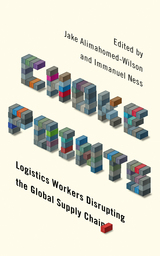
But there are vulnerabilities, and Choke Points reveals them—and the ways that workers are finding ways to make use of the power that those choke points afford them. Exploring a number of case studies around the world, this book uncovers a little-known network of resistance by logistics workers worldwide who are determined to contest their exploitation by the forces of global capital. Through close accounts of wildcat strikes, roadblocks, and boycotts, from South China to Southern California, the contributors build a picture of a movement that flies under the radar, but carries the potential to force dramatic change.
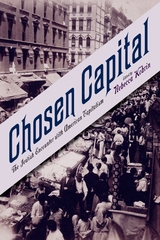
Surveying such diverse topics as Jews’ participation in the real estate industry, the liquor industry, and the scrap metal industry, as well as Jewish political groups and unions bent on reforming American capital, such as the American Labor Party and the International Ladies’ Garment Workers’ Union, contributors to this volume provide a new prism through which to view the Jewish encounter with America. The volume also lays bare how American capitalism reshaped Judaism itself by encouraging the mass manufacturing and distribution of foods like matzah and the transformation of synagogue cantors into recording stars. These essays force us to rethink not only the role Jews played in American economic development but also how capitalism has shaped Jewish life and Judaism over the course of the twentieth century.
Contributors:
Marni Davis, Georgia State University
Phyllis Dillon, independent documentary producer, textile conservator, museum curator
Andrew Dolkart, Columbia University
Andrew Godley, Henley Business School, University of Reading
Jonathan Karp, executive director, American Jewish Historical Society
Daniel Katz, Empire State College, State University of New York
Ira Katznelson, Columbia University
David S. Koffman, New York University
Eli Lederhendler, Hebrew University, Jerusalem
Jonathan Z. S. Pollack, University of Wisconsin—Madison
Jonathan D. Sarma, Brandeis University
Jeffrey Shandler, Rutgers University
Daniel Soyer, Fordham University

The period immediately preceding World War II was probably the most critical in the history of the American labor movement. Prior to 1936, the trade unions were weak, but by 1941 a fundamental change in power relationships enabled them to penetrate the strongholds of American industry—steel and automobiles.
The CIO Challenge to the AFL is a three-part study. It discusses the split in the American Federation of Labor and the formation of the Congress of Industrial Organizations; presents eighteen specific industry or union case studies, each an independent essay in economic history; and, finally, analyzes various general aspects of the labor movement.
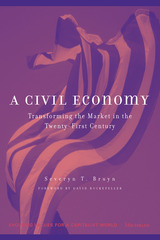
Severyn T. Bruyn describes how people in three sectors--government, business, and the Third Sector (nonprofits and civil groups)--can develop an accountable, self-regulating, profitable, humane, and competitive system of markets that could be described as a civil economy. He examines how government officials can organize markets to reduce government costs; how local leaders deal with global corporations that would unfairly exploit their community resources; and how employees can become coparticipants in the development of human values in markets.
A Civil Economy is oriented to interdiciplinary studies of the economy, assisting scholars in diverse fields, such as business management, sociology, political science, and economics, in developing a common language to examine civic problems in the marketplace.
As an undergraduate text, it evokes a mode of thought about the development of a self-accountable system of markets. Students learn to understand how the market economy becomes socially accountable and self-reliant, while remaining productive, competitive, and profitable.
Sveryn T. Bruyn is Professor of Sociology, Boston College.
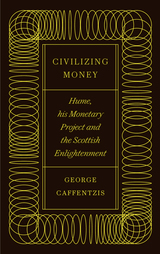
Taking the Scottish Enlightenment philosopher David Hume as its subject, this book breaks new ground in focusing its lens on a little-studied aspect of Hume’s thinking: his understanding of money.
George Caffentzis makes both an intervention in the field of monetary philosophy and into Marxian conceptions of the relation between philosophy and capitalist development. He vividly charts the ways in which Hume’s philosophy directly informed the project of ‘civilizing’ the people of the Scottish Highlands and pacifying the English proletariat in response to the revolts of both groups at the heart of the empire.
Built on careful historical and philosophical detective work, Civilizing Money offers a stimulating and radical political reading of the ways in which Hume’s fundamental philosophical claims performed concrete political functions.
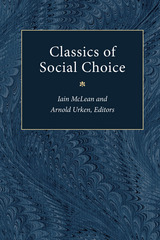
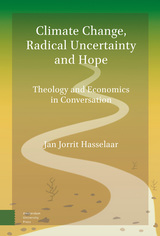
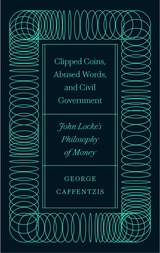
This book situates John Locke’s philosophy of knowledge and his political theory within his engagement in British monetary debates of the 17th and 18th century.
Anchored in extensive archival research, George Caffentzis offers the most expansive reading of Locke’s economic thought to date, contextualizing it within the expansion of capitalist accumulation on a world scale and the universality of money as a medium of exchange.
Updated with a new introduction by Paul Rekret, a new foreword by Harry Cleaver and new material by the author, Clipped Coins, Abused Words, and Civil Government continues to make a significant intervention in contemporary debates around the history of capitalism, colonialism and philosophy.




A pioneer in bringing mathematical methods into everyday use in economics, Lloyd A. Metzler is well known for his adroit use of formal tools and exceptionally readable prose style which have provided a generation of economists with clear solutions to difficult analytical problems. The papers collected in this volume, including four previously unpublished, retain a freshness and clarity that is readily recognized by today's students of economics.
Over the years Mr. Metzler's contributions to economic theory have ranged widely over the fields of international economics, macroeconomic theory, business fluctuations, and the mathematical theory of general equilibrium. Most notably, he carries Lord Keynes's theories further, working out the essential properties of the foreign-trade multiplier. His discussions of tariff repercussions, capital transfers, and stability conditions in the foreign-exchange market are of vital importance to today's dramatic efforts to achieve economic stability throughout the world.
Collected Papers, enhanced by many tables and figures and clearly indicative of the author's far-reaching economic mind, is organized into four sections: The Theory of International Trade; Money, Interest, and Prices; Business Cycles and Economic Fluctuations; and Mathematical Economics and Statistics. Two of the articles in this volume were part of the author's doctoral thesis which was awarded the David A. Wells Prize at Harvard University.

Unlike the papers of some other great economists, those of Kenneth Arrow are being read and studied today with even greater care and attention than when they first appeared in the journals. The publication of his collected papers will therefore be welcomed by economists and other social scientists and in particular by graduate students, who can draw from them the deep knowledge and the discernment in selection of scientific problems that only a master can offer. The author has added headnotes to certain well-known papers, describing how he came to write them.
The study of production is central to economic theory, and capital and its accumulation are two of the most interesting aspects of the modern production process. Capital may take the form of inventories of inputs, inventories of outputs, or machines and other fixed goods. The essential and unique aspect of all types of capital is that it must be accumulated as the result of prior stages of the production process. This gives the dynamic theory of production a recursive structure that can be exploited by economic analysis. The optimization of production under recursive conditions lends itself to general mathematical methods of dynamic programming and optimal control theory. This is the main theme of the essays included in this fifth volume of Kenneth Arrow's Collected Papers.

Unlike the papers of some other great economists, those of Kenneth Arrow are being read and studied today with even greater care and attention than when they first appeared in the journals. The publication of his collected papers will therefore be welcomed by economists and other social scientists and in particular by graduate students, who can draw from them the deep knowledge and the discernment in selection of scientific problems that only a master can offer. The author has added headnotes to certain well-known papers, describing how he came to write them.
Although economic theory has been Kenneth Arrow's comparative advantage as well as his special interest, from time to time he has turned his attention to applied problems, often with unexpected results. A request from the Ford Foundation to write a survey of health economics led to his famous paper, "Uncertainty and the Welfare Economics of Medical Care," which raised for the first time many issues in the economics of information, particularly what are now called incentive compatibility issues. Other fruitful papers included in this volume deal with racial discrimination, the cost of oil imports, health insurance, environmental resources, and urban economics. Arrow's main interest in studying these disparate problems has been their potential source for new theory as well as their policy applications.
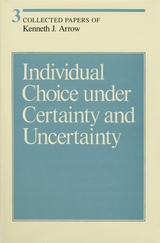
Unlike the papers of some other great economists, those of Kenneth Arrow are being read and studied today with even greater care and attention than when they first appeared in the journals. The publication of his collected papers will therefore be welcomed by economists and other social scientists and in particular by graduate students, who can draw from them the deep knowledge and the discernment in selection of scientific problems that only a master can offer. The author has added headnotes to certain well-known papers, describing how he came to write them.
The third volume of Kenneth Arrow's Collected Papers concerns the basic concept of rationality as it applies to an economic decision maker. In particular, it addresses the problem of choice faced by consumers in a multicommodity world and presents specific models of choice useful in economic analysis. It also discusses choice models under uncertainty, giving the basic theory and critiques of this theory based on experimental evidence and applications. Among the major papers are "Alternative Approaches to the Theory of Choice in Risk-Taking Situations," a masterly survey of subjective probability and choice theory, and "The Theory of Risk Aversion," an exposition of the theory of choice under uncertainty.

Unlike the papers of some other great economists, those of Kenneth Arrow are being read and studied today with even greater care and attention than when they first appeared in journals. This publication of his collected papers, to be completed in seven topical volumes, will be welcomed by economists and other social scientists and in particular by graduate students, who can draw from them the deep knowledge and taste in the selection of scientific problems that only a master can offer.
This volume is concerned with the foundations of neo-classical economic analysis. General equilibrium is a theory of prices in which all of the actions of the economic agents in an economy are determined simultaneously and in a decentralized fashion. The price system, determined in competitive markets, guides actions for both firms and individual consumers. All of the complex interrelations of the economy are distilled into the determination of this price system.
In these papers, Arrow examines the conditions under which such a price system would exist. He also clarifies the conditions under which the system can or cannot achieve an optimum. In the latter case, when “market failures” are present, he shows the role of a benevolent government in helping to overcome the induced inefficiencies.

Unlike the papers of some other great economists, those of Kenneth Arrow are being read and studied today with even greater care and attention than when they first appeared in the journals. The publication of his collected papers will therefore be welcomed by economists and other social scientists and in particular by graduate students, who can draw from them the deep knowledge and the discernment in selection of scientific problems that only a master can offer. The author has added headnotes to certain well-known papers, describing how he came to write them.
This volume begins with Arrow's papers on statistical decision theory, which served as a foundation for his work on the economics of information. As he writes in his preface, "Statistical method was an example for the acquisition of information. In a world of uncertainty, it was no great leap to realize that information is valuable in an economic sense." The later, applied papers, which operationalize the theory of the early ones, include essays on the demand for information, the economic value of screening devices, and the effect of incomplete information on the structure of organizations, futures markets, and insurance.

Unlike the papers of some other great economists, those of Kenneth Arrow are being read and studied today with even greater care and attention than when they first appeared in the journals. The publication of his collected papers will therefore be welcomed by economists and other social scientists and in particular by graduate students, who can draw from them the deep knowledge and the discernment in selection of scientific problems that only a master can offer. The author has added headnotes to certain well-known papers, describing how he came to write them.
In this first volume, Arrow takes up the basic question of whether collective choices can be made in such a way as to reflect individual preferences. The seminal 1950 paper that opens the volume shows that given certain reasonable conditions that social choices must satisfy to reflect individual preferences, it is impossible to make a choice among all sets of alternatives without violating some of the conditions. The subsequent papers extend, deepen, and clarify these results and examine the concept of justice, both in the abstract and in economic models. The volume also contains searching critiques of the theories of justice of John Rawls and Robert Nozick.
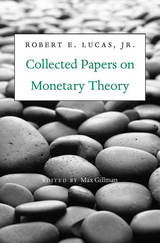
Robert Lucas is one of the outstanding monetary theorists of the past hundred years. Along with Knut Wicksell, Irving Fisher, John Maynard Keynes, James Tobin, and Milton Friedman (his teacher), Lucas revolutionized our understanding of how money interacts with the real economy of production, consumption, and exchange.
Lucas’s contributions are both methodological and substantive. Methodologically, he developed dynamic, stochastic, general equilibrium models to analyze economic decision-makers operating through time in a complex, probabilistic environment. Substantively, he incorporated the quantity theory of money into these models and derived its implications for money growth, inflation, and interest rates in the long run. He also showed the different effects of anticipated and unanticipated changes in the stock of money on economic fluctuations, and helped to demonstrate that there was not a long-run trade-off between unemployment and inflation (the Phillips curve) that policy-makers could exploit.
The twenty-one papers collected in this volume fall primarily into three categories: core monetary theory and public finance, asset pricing, and the real effects of monetary instability. Published between 1972 and 2007, they will inspire students and researchers who want to study the work of a master of economic modeling and to advance economics as a pure and applied science.
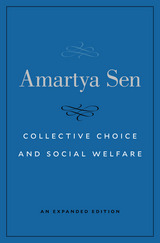
Originally published in 1970, this classic study has been recognized for its groundbreaking role in integrating economics and ethics, and for its influence in opening up new areas of research in social choice, including aggregative assessment. It has also had a large influence on international organizations, including the United Nations, notably in its work on human development. The book showed that the “impossibility theorems” in social choice theory—led by the pioneering work of Kenneth Arrow—do not negate the possibility of reasoned and democratic social choice.
Sen’s ideas about social choice, welfare economics, inequality, poverty, and human rights have continued to evolve since the book’s first appearance. This expanded edition preserves the text of the original while presenting eleven new chapters of fresh arguments and results.
“Expanding on the early work of Condorcet, Pareto, Arrow, and others, Sen provides rigorous mathematical argumentation on the merits of voting mechanisms…For those with graduate training, it will serve as a frequently consulted reference and a necessity on one’s book shelf.”
—J. F. O’Connell, Choice

The most crucial choice a high school graduate makes is whether to attend college or to go to work. Here is the most sophisticated study of the complexities behind that decision.
Based on a unique data set of nearly 23,000 seniors from more than 1,300 high schools who were tracked over several years, the book treats the following questions in detail: Who goes to college? Does low family income prevent some young people from enrolling, or does scholarship aid offset financial need? How important are scholastic aptitude scores, high school class rank, race, and socioeconomic background in determining college applications and admissions? Do test scores predict success in higher education?
Using the data from the National Longitudinal Study of the Class of 1972, the authors present a set of interrelated analyses of student and institutional behavior, each focused on a particular aspect of the process of choosing and being chosen by a college. Among their interesting findings: most high school graduates would be admitted to some four-year college of average quality, were they to apply; applicants do not necessarily prefer the highest-quality school; high school class rank and SAT scores are equally important in college admissions; federal scholarship aid has had only a small effect on enrollments at four-year colleges but a much stronger effect on attendance at two-year colleges; the attention paid to SAT scores in admissions is commensurate with the power of the scores in predicting persistence to a degree. This clearly written book is an important source of information on a perpetually interesting topic.

In College Choices, Caroline Hoxby and a distinguished group of economists show how students and their families really make college decisions—how they respond to financial aid options, how peer relationships figure in the decision-making process, and even whether they need mentoring to get through the admissions process. Students of all sorts are considered—from poor students, who may struggle with applications and whether to continue on to college, to high aptitude students who are offered "free rides" at elite schools. College Choices utilizes the best methods and latest data to analyze the college decision-making process, while explaining how changes in aid and admissions practices inform those decisions as well.


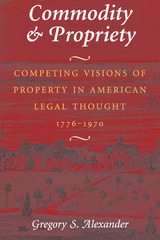
In demonstrating how the understanding of property as a private basis for the public good has competed with the better-known market-oriented conception, Alexander radically rewrites the history of property, with significant implications for current political debates and recent Supreme Court decisions.
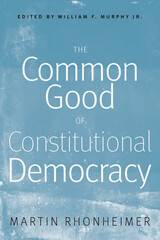

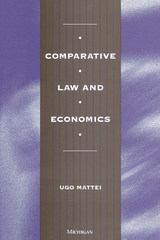
Mattei shows how concepts from economics can be applied to the study of comparative law. He then applies the concepts to several significant problems in comparative law, including the history and sources of law, differences between civil and common law systems, and the reasons for legal change and the movement of law from one country to another. He looks at specific problems in property, contracts, and trust law. Finally he uses the insights he has developed to understand the issues involved in changing law in developing countries and in formerly socialist countries.
This book will be of interest to scholars of law, economics, and development, as well as those interested in transformation in formerly communist states.
Ugo Mattei is Alfred and Hanna Fromm Professor of International and Comparative Law, Hastings College of Law, University of California; and Professor of Civil Law, University of Trento.


The majority of the balance sheets were created especially for this project, their components gleaned from fragmentary and heterogeneous data. There are approximately 3,500 entries, each measuring the value of one type of tangible or financial asset or liability at a given date. Goldsmith's estimates are keyed to fifteen benchmark dates in the economic progress of the cited nations, and for twelve nations he was able to construct balance sheets dating back to the nineteenth century or earlier. Combined, worldwide balance sheet are included for 1950 and 1978.
Comparative National Balance Sheets will provide an essential basis for the quantitative analysis of the long-term financial development of these nations. In addition to national balance sheets for all large countries except Brazil and China, sectoral balance sheets for France, Germany, Great Britain, India, Japan, and the United States in the postwar period are also included.
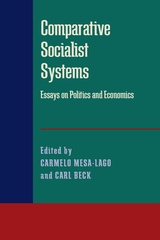

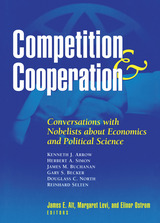

With the nations of the world becoming more interdependent, it is imperative to take international influences into account in understanding the organization of industry within a country. This book extends the structure/conduct/performance framework of analysis to present a fully specified simultaneous equation model of an open economy—Canada.
By estimating a system of equations of all the major variables, the authors can identify which variables are dependent and which are independent. They are thus able to assess the relative importance of such factors as seller concentration, import competition, retailing structure, advertising expenditure, research and development spending, and technical and allocative efficiency in shaping the organization of industry in Canada. In addition, using both industry-level and firm-level data, the authors develop methods for assessing the effect of structural variables on diversification strategies and the consequences for market performance. They also study the effects of such variables on firms’ access to capital markets. The book concludes with a discussion of the implications of the findings for government policy.

Investment banks play a critically important role in channeling capital from investors to corporations. Not only do they float and distribute new corporate securities, they also assist companies in the private placement of securities, arrange mergers and acquisitions, devise specialized financing, and provide other corporate financial services.
After sketching the history and evolution of investment banking, the authors describe the structure of the industry, focusing on the competitive forces at work within it today. They explore patterns of concentration and analyze the strategic and economic factors that underlie those patterns. The authors directly examine the pairing up of investment banks with their corporate clients. They show that the market is sharply segmented, with banks and corporate clients being matched in roughly rank order, the most prestigious banks with the largest, most powerful clients, and so on. Vigorous competition occurs within each segment, but much less between them.
With the industry now confronting a changing regulatory environment, a growing tendency of clients to arrange their own financing, and increasing competition both from within and from commercial banks and foreign institutions, Competition in the Investment Banking Industry is essential reading for anyone interested in the future of investment banking.

In this vigorous and well-documented "current view" of competition in the mid-western coal industry, Reed Moyer has set himself two tasks: to bring up to date existing economic analyses and to correct a "distortion which arises from generalizing about an industry composed of several diverse parts."
Most previous economic analyses have become obsolete, partly because of the shifting picture within the industry. Moyer’s detailed study of the economic behavior of the midwestern coal industry focuses on the transformation in the mining operation. Contrary to popular opinion, the bituminous coal industry in the Midwest is not "chronically depressed"; instead, it is successfully surmounting years of stagnation dating back to the 1920s, the effects of strikes, and the stiff competition offered coal by other fuels in the recent past. Concerned primarily with the coal producing regions of Illinois, Indiana, and western Kentucky, the author considers not only the economic factors touching the industry, but the geologic and geographic as well. In a framework of market structure, conduct, and performance Moyer analyzes in detail the "geographically isolated position of the midwestern coal industry," which "limits interdistrict competition."
Ample discussion is devoted to factors which influence the structural characteristics and the economic behavior of the industry: seller concentration, the importance of freight rates in determining delivery costs, price competition, entry barriers, and the effect of mining techniques on resource conservation, to name a few. The book includes an extensive treatment of the mining methods, strip and underground, common to the region, and their influence on its economic picture. This crisply written technical study searches thoroughly into the many facets of a leading component of a still lively major industry. The author has drawn on a supply of unpublished material as well as on information from confidential sources.
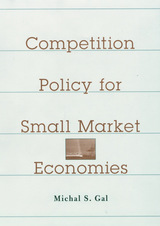
For the most part, competition policy literature has focused on large economies. Yet the economic paradigms on which such policies are based do not necessarily apply to small market economies. This book demonstrates that optimal competition policy is very much dependent on the size of an economy. Whether and how firms compete is a matter of the natural conditions of the markets in which firms operate. A critical feature of small economies is the concentrated nature of many of their markets, which are often protected by high entry barriers. Competition policy must be designed to deal effectively with these unique obstacles to competition. Accordingly, applying the same competition policy to all economies alike may be contrary to the policy's goals.
Michal Gal's thorough analysis shows the effects of market size on competition policy, ranging from rules of thumb to more general policy prescriptions, such as goals and remedial tools. Competition policy in small economies is becoming increasingly important, since the number of small jurisdictions adopting such policy is rapidly growing. Gal's focus extends beyond domestic competition policy to the evaluation of the current trend toward the worldwide harmonization of policies. This book will provide important guidance to academics, policy makers, and practitioners of competition policy as well as to anyone interested in the globalization of competition laws.

William Lazonick explores how technological change has interacted with the organization of work, with major consequences for national competitiveness and industrial leadership. Looking at Britain, the United States, and Japan from the nineteenth century to the present, he explains changes in their status as industrial superpowers. Lazonick stresses the importance for industrial leadership of cooperative relations between employers and shop-floor workers. Such relations permit employers to use new technologies to their maximum potential, which in turn transforms the high fixed costs inherent in these technologies into low unit costs and large market shares. Cooperative relations can also lead employers to invest in the skills of workers themselves--skills that enable shop-floor workers to influence quality as well as quantity of production.
To build cooperative shop-floor relations, successful employers have been willing to pay workers higher wages than they could have secured elsewhere in the economy. They have also been willing to offer workers long-term employment security. These policies, Lazonick argues, have not come at the expense of profits but rather have been a precondition for making profits.
Focusing particularly on the role of labor-management relations in fostering "flexible mass production" in Japan since the 1950s, Lazonick criticizes those economists and politicians who, in the face of the Japanese challenge, would rely on free markets alone to restore the international competitiveness of industry in Britain and the United States.
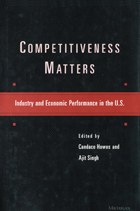
competitiveness is a dangerous obsession that distracts us from the question most central to solving the problem of stagnant real income growth, namely, what causes productivity growth, especially in the service sector.
The central argument is that, if the U.S. economy is to achieve full employment with rising real wages, it is necessary to enhance the competitiveness of its tradable goods sector. The book shows that current account deficits cannot be explained by macroeconomic mismanagement but are rather the consequence of an uncompetitive manufacturing sector. It finds that the long-term health of the manufacturing sector requires not only across-the-board policies to remedy problems of low or inefficient investment, but also sectoral policies to address problems that are strategic to resolving the balance of payments problems. Lessons are drawn from the experience of some European and Asian countries.
This book will be of interest to economists, political scientists, and business researchers concerned with the place of the manufacturing sector in overall health of the U.S. economy, with issues of industrial policy and industrial restructuring, and with the conditions for rising standards of living.
Candace Howes is Associate Professor, Barbara Hogate Ferrin Chair, Connecticut College. Ajit Singh is Professor of Economics, Queens College, Cambridge.

Bohr’s term complementarity describes a situation, unavoidable in quantum physics, in which two theories thought to be mutually exclusive are required to explain a single phenomenon. Light, for example, can only be explained as both wave and particle, but no synthesis of the two is possible. This theoretical transformation is then examined in relation to the ways that Derrida sets his work against or outside of Hegel, also resisting a similar kind of synthesis and enacting a transformation of its own.
Though concerned primarily with Bohr and Derrida, Plotnitsky also considers a wide range of anti-epistemological endeavors including the work of Nietzsche, Bataille, and the mathematician Kurt Gödel. Under the rubric of complementarity he develops a theoretical framework that raises new possiblilities for students and scholars of literary theory, philosophy, and philosophy of science.

This account of efforts to build a domestic Japanese computer industry is enlivened with quotations from industrial leaders commenting on the stages through which Japan has emerged as a world-class competitor.
In the late 1950s, Japan was still relying on IBM and other foreign suppliers. After the decision to enter the computer field, the government used protectionism, financial aid, and cooperative R&D projects to assist firms in developing hardware and improving their technology. The establishment of a quasi-public computer rental company to carry the burden of financing rentals played a key role in helping fledgling firms compete with IBM.
Marie Anchordoguy shows how government intervention in the market avoided the risks of technological sluggishness by encouraging keen competition among domestic computer firms. She traces the growth of Japanese computer hardware to Japan’s position as an exporter of mainframes and describes some of the problems encountered in producing software. This study provides a clear example of the way in which government–industry cooperation has enhanced Japan’s position in the world market.
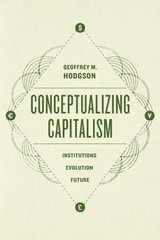
With Conceptualizing Capitalism, Geoffrey M. Hodgson offers readers a more precise conceptual framework. Drawing on a new theoretical approach called legal institutionalism, Hodgson establishes that the most important factor in the emergence of capitalism—but also among the most often overlooked—is the constitutive role of law and the state. While private property and markets are central to capitalism, they depend upon the development of an effective legal framework. Applying this legally grounded approach to the emergence of capitalism in eighteenth-century Europe, Hodgson identifies the key institutional developments that coincided with its rise. That analysis enables him to counter the widespread view that capitalism is a natural and inevitable outcome of human societies, showing instead that it is a relatively recent phenomenon, contingent upon a special form of state that protects private property and enforces contracts. After establishing the nature of capitalism, the book considers what this more precise conceptual framework can tell us about the possible future of capitalism in the twenty-first century, where some of the most important concerns are the effects of globalization, the continuing growth of inequality, and the challenges to America’s hegemony by China and others.
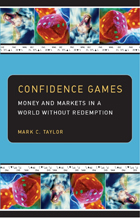
In Confidence Games, Mark C. Taylor considers the implications of these developments for our digital and increasingly virtual economy. According to Taylor, money and markets do not exist in a vacuum but grow in a profoundly cultural medium, reflecting and in turn shaping their world. To understand the recent changes in our economy, it is not enough to analyze the impact of politics and technology—one must consider the influence of art, philosophy, and religion as well.
Bringing John Calvin, G. W. F. Hegel, and Adam Smith to Wall Street by way of Las Vegas, Taylor first explores the historical and psychological origins of money, the importance of religious beliefs and practices for the emergence of markets, and the unexpected role of religion and art in the classical understanding of economics. He then moves to an account of economic developments during the past four decades, exploring the dawn of our new information age, the growing virtuality of money and markets, and the complexity of the networks by which monetary value is now negotiated.
Returning full circle to a version of the market first proposed by Adam Smith when he used theology and aesthetics to rethink economics, Confidence Games closes with a plea for a conception of life that embraces uncertainty and insecurity as signs of the openness of the future. Like religion and economics, life is a confidence game in which the challenge is not to find redemption but to learn to live without it.
"Before the global credit system began its collapse in 2007, Mark Taylor had connected the dots between increasingly complex financial instruments and larger cultural forces. Anyone who wants to understand the disappearing foundation of our financial markets needs to read this book immediately."—Michael Lewitt, editor, The HCM Market Letter

Scholars representing the fields of political science, philosophy, history, law, literature, and cultural studies devote essays to the work of Nietzsche, Weber, Heidegger, Lukács, Schmitt, Marcuse, Adorno, and Habermas. They also discuss the writings of such figures as Brecht and Freud, who are not primarily thought of as political theorists, and explore the thought of Helmut Plessner and reformist theorists from East Germany who have been little studied in the English language. In the process of debating the nature and responsibilities of the modern state in an era of mass politics, unparalleled military technology, capacity for surveillance, and global media presence, the contributors question whether technology is best understood as an instrument of human design and collective control or as an autonomous entity that not only has a will and life of its own but one that forms the very fabric of modern humanity.
Contributors. Seyla Benhabib, Richard J. Bernstein, Peter C. Caldwell, Richard Dienst, David Dyzenhaus, Andrew Feenberg, Nancy S. Love, John P. McCormick, Jan-Werner Müller, Gia Pascarelli, William E. Scheuerman, Steven B. Smith, Tracy B. Strong, Richard Wolin
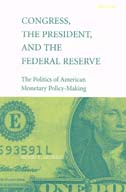
Current formal theories of the general policy-making process are utilized to construct an explanatory framework that identifies the mechanisms through which congressional and executive influence is exercised. The theoretical framework presented in the text also helps to explain the political dynamics of several of the most significant policy decisions of the Federal Reserve during the last half-century. In addition, this book provides a unique perspective on the manner in which Fed policymakers attempt to shield themselves from unwelcome political influence.
While the main focus of Congress, the President, and the Federal Reserve is monetary policy-making, it also speaks to the political nature of policy-making in a more general sense and provides a guide for the future study of the political dynamics in a wide variety of substantive policy areas. Thus it will interest not only political scientists and economists interested in monetary policy-making specifically but also those interested in the nature of public policy-making more generally.
Irwin L. Morris is Assistant Professor of Political Science, University of Maryland.
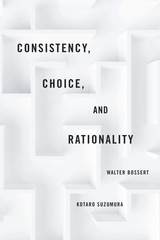
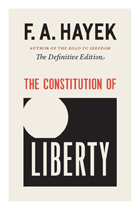
From the $700 billion bailout of the banking industry to president Barack Obama’s $787 billion stimulus package to the highly controversial passage of federal health-care reform, conservatives and concerned citizens alike have grown increasingly fearful of big government. Enter Nobel Prize–winning economist and political theorist F. A. Hayek, whose passionate warning against empowering states with greater economic control, The Road to Serfdom, became an overnight sensation last summer when it was endorsed by Glenn Beck. The book has since sold over 150,000 copies.
The latest entry in the University of Chicago Press’s series of newly edited editions of Hayek’s works, The Constitution of Liberty is, like Serfdom, just as relevant to our present moment. The book is considered Hayek’s classic statement on the ideals of freedom and liberty, ideals that he believes have guided—and must continue to guide—the growth of Western civilization. Here Hayek defends the principles of a free society, casting a skeptical eye on the growth of the welfare state and examining the challenges to freedom posed by an ever expanding government—as well as its corrosive effect on the creation, preservation, and utilization of knowledge. In opposition to those who call for the state to play a greater role in society, Hayek puts forward a nuanced argument for prudence. Guided by this quality, he elegantly demonstrates that a free market system in a democratic polity—under the rule of law and with strong constitutional protections of individual rights—represents the best chance for the continuing existence of liberty.
Striking a balance between skepticism and hope, Hayek’s profound insights are timelier and more welcome than ever before. This definitive edition of The Constitution of Liberty will give a new generation the opportunity to learn from his enduring wisdom.

READERS
Browse our collection.
PUBLISHERS
See BiblioVault's publisher services.
STUDENT SERVICES
Files for college accessibility offices.
UChicago Accessibility Resources
home | accessibility | search | about | contact us
BiblioVault ® 2001 - 2024
The University of Chicago Press









